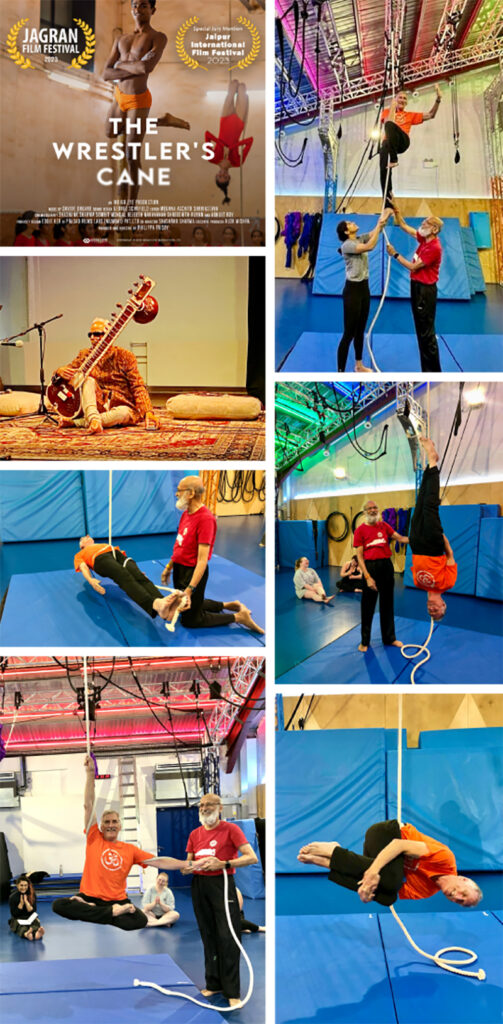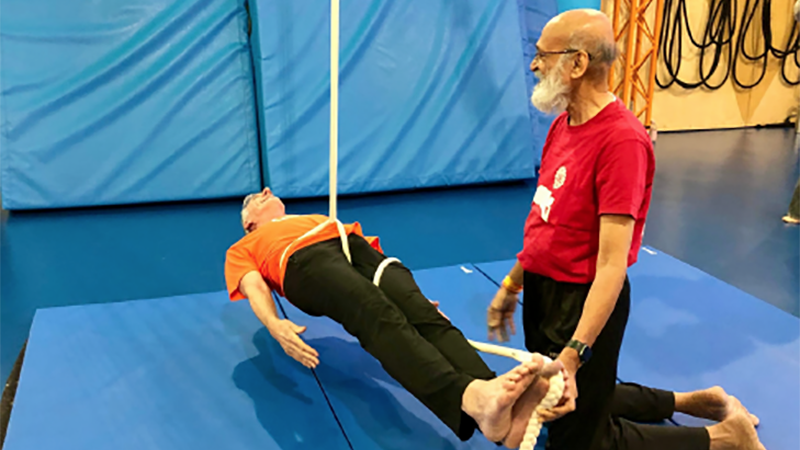Mallakhamb Workshop
On 9th April, I attended a two-hour Mallakhamb workshop in London. Two weeks earlier I’d never heard of that word, but I was intrigued by an invitation to: ‘learn Mallakhamb, an extension of yoga practised on a rope and a pole.’
Is it yoga? Is it a sport? I was curious to find out.
Mallakhamb combines elements of gymnastics, yoga, and martial arts, performed on an eight foot high vertical wooden pole, a hanging pole, or a rope. The practice has its roots in ancient Indian traditions and became used as a training aid for wrestlers, incorporating yogic elements over time. The Mallakhamb Federation of India organises National Championships and the first World Championships took place in 2019. If the growth of the sport outside India continues at its current rate, it could become an Olympic event.
It was the award-winning documentary, The Wrestler’s Cane, made by Indigo Eye Productions and directed by Philippa Frisby, that first brought Mallakhamb to my attention. The film centres on the life and work of Uday Deshpande who has dedicated over 54 years of his life to teaching Mallakhamb and encouraging its uptake throughout and beyond India. There are now Mallakhamb centres in most Indian states. For his outstanding contribution to Mallakhamb, Uday Deshpande has received the Padma Shri, India’s fourth highest civilian award.
A series of workshops and events was organised in London by Philippa Frisby, including the premiere screening of The Wrestler’s Cane at The Nehru Centre, the cultural wing of The High Commission of India in the UK. Workshops and other events were designed to raise awareness about Mallakhamb and the outstanding work of Uday Deshpande.
I arrived at the Mallakhamb workshop venue in Peckham, South London with a mixture of curiosity and trepidation. The name of the venue, ‘Flying Fantastic,’ hinted at what lay ahead. I went in anyway, and was greeted by Philippa Frisby, the event organiser, Uday Deshpande, and his assistant Aditi Karambelkar. The workshop, with six students, began with a brief introduction to Mallakhamb and then a series of warm-up exercises. The special teak pole being shipped over from India for the workshops hadn’t made it to Peckham in time, unfortunately, so our session was all about rope yoga. We were shown a series of asanas on the rope, gradually increasing in difficulty from challenging to ‘surely not’. I remember a shavasana (corpse pose), paschimottanasana (seated forward bend), a hanging padmasana (lotus pose) and swinging in various other postures. Aditi demonstrated each one with great ease and grace. The students then followed one by one, guided and supported with admirable patience by Uday Deshpande and Aditi. Thanks to them, and the encouragement of our fellow students and Philippa Frisby, we all achieved so much more than we thought we would, and left the workshop with a real buzz.
Was it yoga? I guess so… I’m not sure what to think. The postures were yoga ones, but on a rope instead of on a mat. This made things more difficult, of course, but I was delighted to get into something resembling a dhanurasana, bow pose, helped by gravity. I’d never got close to one of those on the yoga mat. Life on the rope demanded total concentration, but it feels like it would take many weeks of practise to reach a stage where it would be possible to relax for long enough to think about anything other than ‘Don’t fall off.’
After the workshop, I made my way to the Nehru Centre for an evening event dedicated to Mallakhamb. The event began with a trailer for The Wrestlers Cane, which highlighted the transformative power of the sport, particularly for a group of unsighted students who had gained life-changing self-belief under Uday Deshpande’s inspirational teaching. Following the trailer, we were treated to a mesmerising sitar recital by the globally renowned Baluji Shrivastav OBE. The evening concluded with a thought-provoking discussion about Mallakhamb, featuring Uday Deshpande, Baluji Shrivastav OBE, and yoga scholar and author Daniel Simpson.

Their insights into the history, philosophy, and contemporary relevance of Mallakhamb further opened the door onto a remarkable sport… or yoga practice.
Reflecting on my experience with Mallakhamb… first of all it was in equal measures challenging, rewarding and good fun! Its unique blend of unusual props, physical challenge and mental focus makes it difficult to categorise as either a sport or a yoga practice. Perhaps it is best though of as a hybrid of the two, requiring the physical strength and flexibility of a sport, but also encouraging the mindfulness and self-awareness aspects that come with yoga. My journey with Mallakhamb, from the initial curiosity sparked by The Wrestler’s Cane to the hands-on experience at the workshop and the insightful discussion at the Nehru Centre, opened my eyes to an ancient Indian discipline but also challenged me to think about the ways in which we define and engage with physical and spiritual practices. Regardless of how we choose to categorise it, Mallakhamb is a fascinating and transformative practice that has the power to enrich the lives of those who embrace it.
Indigo Eye – The Wrestler’s Cane: https://www.indigoeyeproductions.co.uk/the-wrestlers-cane/
Uday Deshpande: https://deshpandeuday.com/about-uday-deshpande/
Mallakhamb Federation of India: https://mallakhambfederationofindia.in/
